|
|
|
Sort Order |
|
|
|
Items / Page
|
|
|
|
|
|
|
| Srl | Item |
| 1 |
ID:
133222
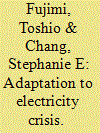

|
|
|
|
|
| Publication |
2014.
|
| Summary/Abstract |
Electricity crises can spur improvements in electricity conservation that would be unachievable under normal circumstances. This paper investigates how businesses adapted to electricity shortages following the March 11, 2011, Great East Japan earthquake, tsunami, and nuclear disaster. In summer 2011, mandatory and voluntary electricity conservation measures affected nearly all of Japan, and peak hour electricity consumption was reduced by a remarkable 18% in the Tokyo region. Using statistical data from 14 business surveys conducted in 2011 and 2012, this paper identifies patterns with regard to type of adaptation, conservation requirements, economic sector, and timeframe. Results indicate that behavioral adaptations (e.g., reduction of illumination or air conditioning) were much more common than schedule adaptations (e.g., shifting production times) or hardware adaptations (e.g., installing energy-efficient devices or private generators). Adaptation patterns were very similar between mandatory and voluntary conservation areas. Manufacturing companies were more likely to implement schedule adaptations than other companies. Certain types of adaptations persisted into 2012, especially reduction of illumination and air conditioning, and installation of energy-efficient devices. These insights may be useful for informing electricity conservation policies in non-crisis contexts.
|
|
|
|
|
|
|
|
|
|
|
|
|
|
|
|
| 2 |
ID:
093408
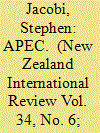

|
|
|
| 3 |
ID:
133600
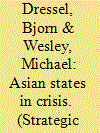

|
|
|
|
|
| Publication |
2014.
|
| Summary/Abstract |
Problems common to many Asian states suggest a pattern of crisis in Asia. The evidence suggests that the root cause is the similarity in the patterns of political development of postcolonial states. In Asia such states have attempted to reconcile state strength and internal diversity by constructing a triangular balance between identity construction, hegemonic governance and economic development. Unfortunately, this fragile balance eroded as state structures matured and economies grew, which increasingly exposed countries to escalating crises of legitimacy and instability. By highlighting changes in the postcolonial state compact within the region, this article seeks to advance both the understanding among theorists of political developments in the region and the understanding among those who govern of the roots of the current crisis.
|
|
|
|
|
|
|
|
|
|
|
|
|
|
|
|
| 4 |
ID:
165204
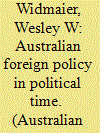

|
|
|
|
|
| Summary/Abstract |
Over the past century, Australian foreign policy orders have been stabilised by the construction of ideas that have reduced uncertainty regarding national interests. Yet, such ideas have often evolved in ways that have engendered misplaced certainty, renewed instability, and crisis. To explain such shifts, I highlight the role of an Australian ‘pragmatic liberal tradition’, one which has enabled alternating tendencies to principled stability or technocratic hubris. In a tripartite model, I trace stages over initial ‘middle power’ efforts to construct ideas that lead states—and particularly great powers—to identify interests in cooperation, misplaced certainty in great power ties which obscures new challenges, and the construction of crises that impede or enable change. Empirically, I apply this framework to the construction, conversion, and crises of the ongoing ‘Reform order’. These span the initial Hawke-era middle power integration of US and regional ties, Howard-era misplaced certainty in US-styled neoconservative bandwagoning and neoliberal macroeconomic accommodation, and evolving constructions of the War on Terror and Global Financial Crisis. In the conclusion, I address theoretical and policy implications, highlighting the initial challenges that crises can pose for middle power leadership, and the subsequent scope for creativity.
|
|
|
|
|
|
|
|
|
|
|
|
|
|
|
|
| 5 |
ID:
127343
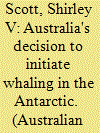

|
|
|
|
|
| Publication |
2014.
|
| Summary/Abstract |
On May 31, 2010, Australia instituted proceedings before the International Court of Justice in the case of Whaling in the Antarctic (Australia v. Japan). Although Australian politicians had for some time threatened such a course of action, the decision to proceed with international litigation took many observers by surprise, most basically because Japan appeared to be in a strong legal position and the risks associated with the case appeared greater than Australia's prospects for success. This article examines the background to the whaling dispute and suggests two ways in which litigation in the World Court may contribute to resolution of the dispute no matter the legal outcome of the case.
|
|
|
|
|
|
|
|
|
|
|
|
|
|
|
|
| 6 |
ID:
095286
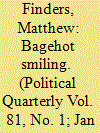

|
|
|
|
|
| Publication |
2010.
|
| Summary/Abstract |
The MPs expenses scandal that erupted in May 2009 has certainly rekindled interest in the next stage of constitutional reform and democratic renewal in Britain. This article examines how Gordon Brown's tenure as Prime Minister has differed from Tony Blair's in relation to the 'new politics' narrative. It argues that despite his long-term personal commitment to major constitutional reforms, the role of crises in recalibrating the political opportunity structure and the manner in which electoral incentives can alter elite attitudes to institutional change that Brown's tenure can be characterised by optimism followed by timidity. Gordon Brown may have flown a few kites in relation to a written constitution, electoral reform, English devolution and the future of the House of Lords but he has left things far too late for a 'constitutional moment'. Brown may have the political inclination but he lacks the capacity to deliver far-reaching reform; Cameron is likely to have the capacity but not the inclination.
|
|
|
|
|
|
|
|
|
|
|
|
|
|
|
|
| 7 |
ID:
161653
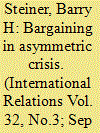

|
|
|
|
|
| Summary/Abstract |
Diplomacy, defined as formal communication and bargaining between states, is subject to limits that diplomatic theory must demarcate and understand. This article compares state incentives and disincentives (including rejection of negotiation as well as refusal to concede) affecting the decision whether to negotiate in six cases of interstate crisis between militarily unequal antagonists. While it has been argued that asymmetric powers are more likely to reach negotiating agreement than their symmetric counterparts, with weaker states doing surprisingly well, that finding is questioned here in the crisis context. For example, the militarily inferior antagonist, attracted to diplomacy as an alternative to war, might well anticipate inferior results from direct negotiations. The weaker antagonist’s unwillingness in these cases to negotiate with a strong opponent suppressed diplomacy, but great power support for the weaker side, and the stronger power’s lack of war readiness, added to the stronger antagonist’s willingness to negotiate.
|
|
|
|
|
|
|
|
|
|
|
|
|
|
|
|
| 8 |
ID:
165289
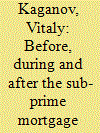

|
|
|
|
|
| Summary/Abstract |
This article examines the connection between investors’ expectations and leading banking crises indicators in Israel before, during and after the sub-prime mortgage crisis. It was found that the coefficients are inconsistent and the indicators cannot be reliable. It was also found that the crisis influence of 2007 is still felt in 2016 and recovering process hasn't been over to this year.
|
|
|
|
|
|
|
|
|
|
|
|
|
|
|
|
| 9 |
ID:
143117
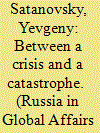

|
|
|
|
|
| Summary/Abstract |
The good thing about our world today is that the spread of information leaves little secret about history. To illustrate this I would like to remind our readers about the Anglo-Russian Convention signed in St. Petersburg in 1907, which left Tibet with China, put Afghanistan under British rule, and divided Iran between Britain and Russia, giving the latter control over the Caspian Sea. If the October Revolution of 1917 had not taken place, the Great Game would have been over. The Sublime Porte shrank enormously after World War I, Russia acquired new territories in Eastern Anatolia under the Sykes-Picot Agreement (a special provision gave Russia control over the Black Sea Straits), and the U.S. presence in the Middle East was barely noticeable, while Britain and France played a leading role in the region.
|
|
|
|
|
|
|
|
|
|
|
|
|
|
|
|
| 10 |
ID:
094926
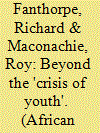

|
|
|
|
|
| Publication |
2010.
|
| Summary/Abstract |
Sierra Leone's conflict has often been characterized as a 'crisis of youth'. For some, the post-war resurgence of grassroots associational life represents the unleashing of long-suppressed youth egalitarianism, yet this analysis tends to ignore the role of international aid in providing an economic incentive for impoverished Sierra Leoneans to embrace formal association. Case study evidence also shows that politics of 'community' identification and moral economies of patronage continue to affect post-war aid. Evidence of post-war social change can nevertheless be found outside the development sector. Diamond mining has long served as a driver of cultural modernization in Sierra Leone and detailed examination of post-war associational life in Kono District reveals that new foci and techniques of social activism have emerged since the end of the civil war. The decline of artisanal mining, with the expansion of large-scale industrial mining, and renewed interest in farming are driving a parallel resurgence of associational life in rural areas. Given that most Sierra Leoneans continue to depend on farming, this rural resurgence could yet represent the most durable basis for democratic change in Sierra Leone.
|
|
|
|
|
|
|
|
|
|
|
|
|
|
|
|
| 11 |
ID:
187040
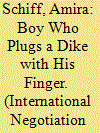

|
|
|
|
|
| Summary/Abstract |
This article highlights the United Nations’ potential contribution in the niche of crisis management. Drawing from the crisis-based approach’s insights on crisis mediation efficacy, and Carnevale’s conceptualization of the mediator’s various strengths as the sources of leverage in mediation, the study explores UN Special Coordinator for the Middle East Peace Process Nickolay Mladenov’s mediation during the Gaza-Israel crisis in 2018–2019. I argue that a combination of contextual and behavioral factors enabled Mladenov to influence the crisis bargaining environment and pull Israel and Hamas back from the brink. These factors included both parties’ need to avoid further escalation; the mediating skills of the UN envoy; the envoy’s reputation, which led others to perceive him as the right person for the mediation mission; the UN mediator’s use of a blend of strategies and tactics; and Mladenov’s ability to apply a range of strengths, including hard power.
|
|
|
|
|
|
|
|
|
|
|
|
|
|
|
|
| 12 |
ID:
134351
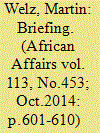

|
|
|
|
|
| Summary/Abstract |
ACADEMIC ANALYSES OF THE PROLONGED CRISIS in the Central African Republic (CAR) and the international response to it are rare. This masks the depth of the crisis. The most recent outbreak of conflict alone, following a coup d'état staged by the Séléka rebels in March 2013, left countless civilians dead,1 more than half a million people displaced, and over half of the 4.6 million population in immediate need of aid.2 Several regional and international organizations, including the African Union (AU), the Economic Community of Central African States (ECCAS), the European Union (EU), and the United Nations (UN), became involved in the process of crisis solution, with all of the organizations deploying troops to the CAR. Their efforts have thus far born limited results; fighting and human suffering continue.
|
|
|
|
|
|
|
|
|
|
|
|
|
|
|
|
| 13 |
ID:
133233
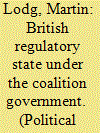

|
|
|
|
|
| Publication |
2014.
|
| Summary/Abstract |
What have been the effects of coalition government on the British regulatory state? This article argues that the politics of regulation have been largely about a continuation of existing patterns, namely volatile stability rather than more far-reaching change. The British regulatory state continues to be defined by boundary conflicts between the world of 'politics' and 'regulation', by conflicting calls for centralisation and decentralised autonomy, and by tensions between the wish to 'reduce' regulation and the realisation of inherent complexities.
|
|
|
|
|
|
|
|
|
|
|
|
|
|
|
|
| 14 |
ID:
108311
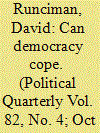

|
|
|
|
|
| Publication |
2011.
|
| Summary/Abstract |
The success story of democracy over the twentieth century has given way to doubts in the twenty-first, as democracies struggle to cope with difficult wars, mounting debts, climate change and the rise of China. This essay uses intellectual history to explain the link between long-term democratic success and short-term democratic failure. It distinguishes three distinct views of what can go wrong with democracy, and identifies the third (which I call 'the confidence trap', an idea that originates with Tocqueville) as the key to understanding our present predicament. Democratic success creates blind spots and a reluctance to tackle long-term problems. I use this idea to explain and put in context Fukuyama's claims about the end of history, and to examine the link between democratic failure and market failure.
|
|
|
|
|
|
|
|
|
|
|
|
|
|
|
|
| 15 |
ID:
160840
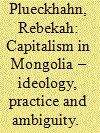

|
|
|
|
|
| Summary/Abstract |
Definitions of and understandings of capitalism are currently the source of much debate in Mongolia’s recent context of severe economic decline. This has followed the differing and sometimes contradictory perceptions of capitalism that have emerged throughout both Mongolia’s recent capitalist history and experiences of socialism. Following an anthropological, generative approach to the making of capitalist economy and drawing from Çalişkan and Callon’s discussion of economization, we explore how the economization of everyday life in Mongolia since 1990 has given rise to a context in which the economy is intensely politicized. This special issue explores the kinds of new economic practices, social formations, ideologies and subjectivities that Mongolia’s capitalist economic forms have produced. We ask what Mongolian processes of economization can tell us about the formation of capitalist economies more generally.
|
|
|
|
|
|
|
|
|
|
|
|
|
|
|
|
| 16 |
ID:
096489
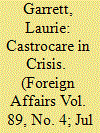

|
|
|
| 17 |
ID:
130688
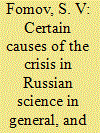

|
|
|
|
|
| Publication |
2014.
|
| Summary/Abstract |
The article focuses on the crisis in Russian Science, particularly Military Science. Topics presented include the crisis in military science as discussed by N.M. Vasilyev on his paper "On the Crisis in Military Science and Ways of Dealing with It," published by Military Thought journal, differences between military art and science, dialectics and materialism as scientific methodology.
|
|
|
|
|
|
|
|
|
|
|
|
|
|
|
|
| 18 |
ID:
127334
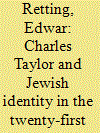

|
|
|
|
|
| Publication |
2013.
|
| Summary/Abstract |
The Jewish world is losing its ability to discuss its cultural differences. Our intra-Jewish dialogue is becoming less coherent. Indeed, the very ideas underlying our Jewish identities, ideas shaped by our language of values, are diverging. The language we use to describe our values is becoming more specific to the respective Jewish communities to which we belong, in Israel and in the Diaspora. We could be heading for a crisis.
|
|
|
|
|
|
|
|
|
|
|
|
|
|
|
|
| 19 |
ID:
133464
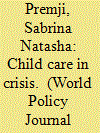

|
|
|
|
|
| Publication |
2014.
|
| Summary/Abstract |
In the winding alleyways of Mlolongo, one of Kenya's densest slums, heavy rainfalls from the previous night carpet the road with mud and animal waste, making both nearly impossible to avoid. Visitors approach and remove their shoes at the door to Mama Agnes' home, a mud shack, then step into a room where the air is pungent with the smell of urine and feces. In the darkness, one misstep and a visitor stumbles upon an infant, who seems unshaken by the accidental nudge. A few steps further lie two dozen more infants, none older than 18 months-some sitting on a broken couch, many lying on the concrete ground. Though all awake, their perfect little bodies remain still, only their bellies rising with each breath. In an eight-foot square space, there are at least 25 babies, and the only sound-silence.
|
|
|
|
|
|
|
|
|
|
|
|
|
|
|
|
| 20 |
ID:
178135
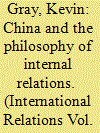

|
|
|
|
|
| Summary/Abstract |
Bieler and Morton’s Global Capitalism, Global War, Global Crisis makes an important and timely contribution to the academic study of the international political economy.1 Based on the philosophy of internal relations, the book seeks to challenge the ‘ontological exteriority’ that is typically posited between key elements of the international system, such as ideas, the social relations of production, the workplace, the ‘social factory’, and the market, state and inter-state system. While the authors draw on a range of theoretical resources and approaches, it is the historical materialism of Antonio Gramsci that provides the key intellectual resource for the numerous theoretical interventions made in the book. For example, Gramsci’s critique of economism and statology provides the basis of an insightful intervention into the structure-agency debate by emphasising the intersections between the social relations of production and class struggle. Gramsci’s theory of hegemony and the integral state, on the other hand, provides the basis of an understanding of the material structure of ideology. As such, Bieler and Morton further strengthen the case for the relevance of Gramsci’s writings not just for the field of International Political Economy but for social theory more broadly.
|
|
|
|
|
|
|
|
|
|
|
|
|
|
|
|
|
|
|
|
|